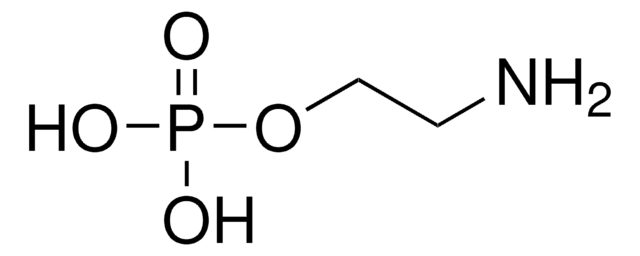E6133
Ethanolamine hydrochloride
≥99.0%
Synonyme(s) :
mea hydrochloride, monoethanolamine hydrochloride, 2-Aminoethanol hydrochloride
About This Item
Produits recommandés
Niveau de qualité
Pureté
≥99.0%
Forme
powder or crystals
Conditions de stockage
dry at room temperature
Technique(s)
HPLC: suitable
Couleur
white
pH
9—10
pKa (25 °C)
9.5
Pf
82-84 °C (lit.)
Solubilité
water: 0.33 g/mL, clear, colorless to very faintly yellow
Densité
1.07 g/cm3 at 20—25 °C
1.12 g/cm3 at 20—25 °C
Adéquation
suitable for chromatography
Application(s)
general analytical
life science and biopharma
pharmaceutical
Chaîne SMILES
NCCO.[H]Cl
InChI
1S/C2H7NO.ClH/c3-1-2-4;/h4H,1-3H2;1H
Clé InChI
PMUNIMVZCACZBB-UHFFFAOYSA-N
Vous recherchez des produits similaires ? Visite Guide de comparaison des produits
Catégories apparentées
Description générale
Application
- in overnight incubation of the tips to attach primary amine groups at the tip surface
- in the preparation of DMEM (dulbecco′s modified eagle′s medium)/F-12 media to culture human epidermal growth factor receptor 2 (HER2) cells derived from MMTV-HER2 transgenic mouse mammary tumors
- to administer the cultures to study its effect on the endogenous phosphatidyl ethanolamine pool and autophagy process
- in a study as a reagent to study molecular interactions and adhesion forces in biological systems using Atomic Force Microscopy
- to prepare the reagent for surface-enhanced laser desorption ionization analysis, aimed at studying the role of Interleukins
Actions biochimiques/physiologiques
Caractéristiques et avantages
- Suitable for Immunology, Cellular Biology and Biochemical Research
- Tested to confirm low levels of heavy metal contamination, ensuring suitability for various applications
- Effective Buffering Agent with a pKa of 9.5 (25 °C)
Autres remarques
Produit comparable
Mention d'avertissement
Warning
Mentions de danger
Classification des risques
Acute Tox. 4 Dermal - Acute Tox. 4 Inhalation - Acute Tox. 4 Oral - Aquatic Chronic 3 - Eye Irrit. 2 - Skin Irrit. 2 - STOT SE 3
Organes cibles
Respiratory system
Code de la classe de stockage
11 - Combustible Solids
Classe de danger pour l'eau (WGK)
WGK 1
Point d'éclair (°F)
Not applicable
Point d'éclair (°C)
Not applicable
Équipement de protection individuelle
dust mask type N95 (US), Eyeshields, Gloves
Faites votre choix parmi les versions les plus récentes :
Déjà en possession de ce produit ?
Retrouvez la documentation relative aux produits que vous avez récemment achetés dans la Bibliothèque de documents.
Les clients ont également consulté
Notre équipe de scientifiques dispose d'une expérience dans tous les secteurs de la recherche, notamment en sciences de la vie, science des matériaux, synthèse chimique, chromatographie, analyse et dans de nombreux autres domaines..
Contacter notre Service technique




